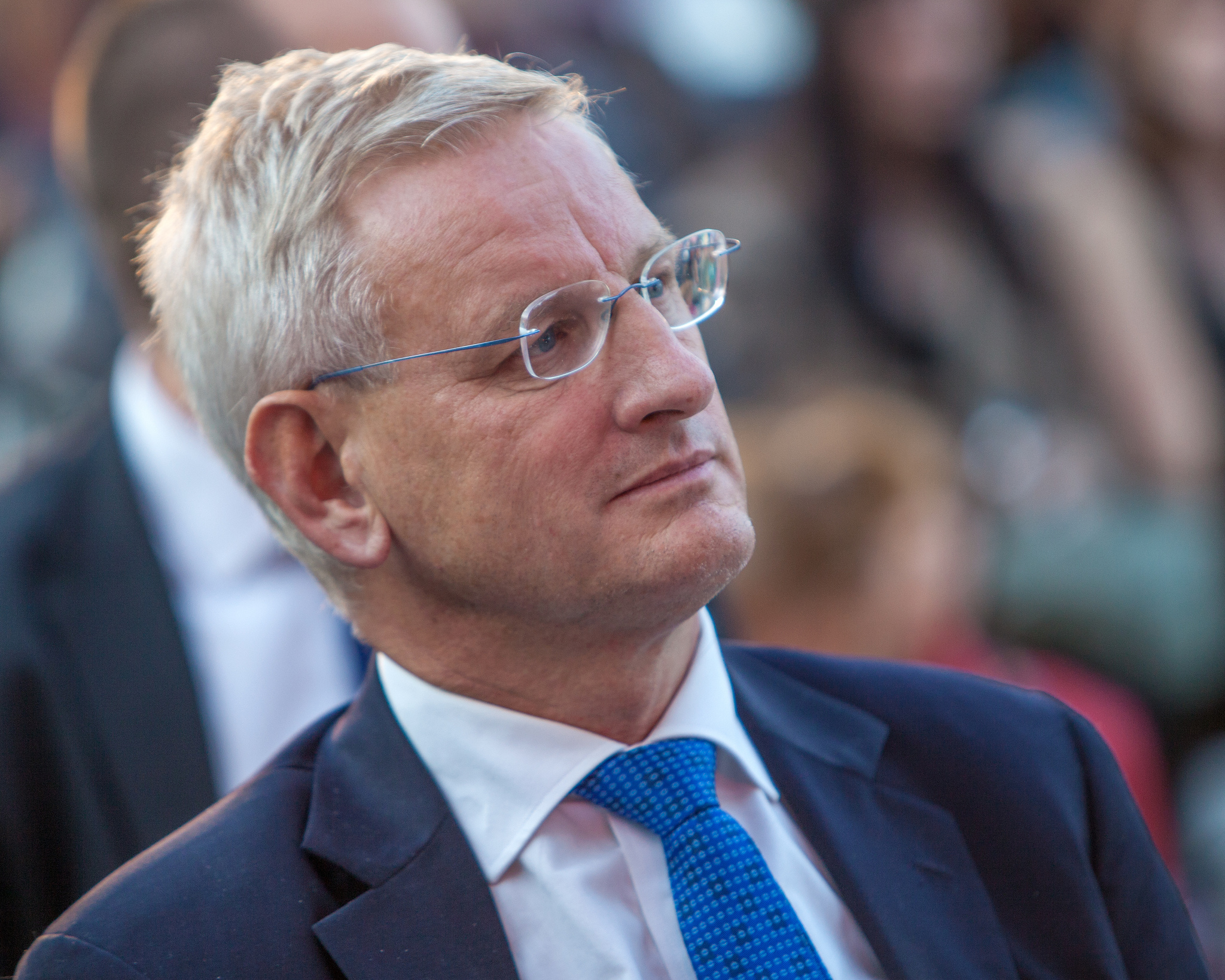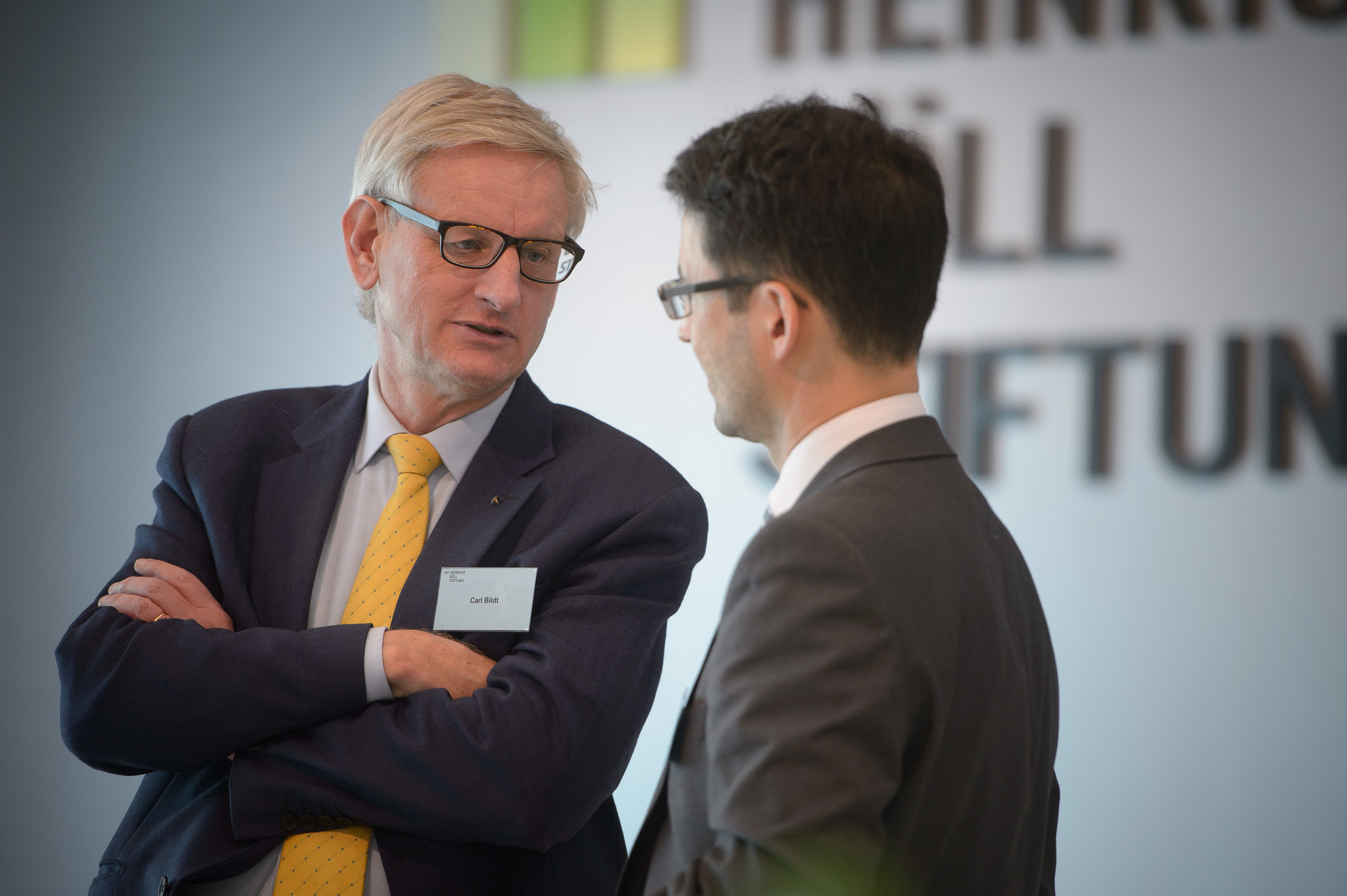On May 20th, on the eve of the European elections, Sweden’s Foreign Minister and one of its most prominent career politicians and diplomats, as well as Foreign Policy Twitterati 100, Carl Bildt, visited UF Malmö. During Carl Bildt’s visit, he talked about his work as the Swedish Foreign Minister, the current challenges of Europe and Sweden, and the importance of the EU elections. Pike & Hurricane had the opportunity to talk with him about Swedish Foreign Policy and the current threats and challenges to its security as well as the emerging field of cyber politics.
Q: One of the pillars of the Swedish foreign policy for the past 200 years has been its policy of non-alignment, with the Swedes taking a lot of pride in not having been at war for over 200 years now. However, since the first years of the 21st century, we have witnessed first the coalition forces in Afghanistan, which Sweden took part in, then in 2003, Sweden provided intelligence to the American air force to find targets in Iraq, according to reports published by Expressen, and lately, Sweden has been providing navigation and radar services, or help, to drone missions in Pakistan. So are we witnessing the demise, or the beginning of the demise, of this policy of non-alignment?
A: Well, yes, I think that was the effect of 1995, when we entered into the European Union. Because from that moment on we couldn’t be non-aligned any longer, so the policy of neutrality effectively disappeared in 1995. After that, we have been building security cooperation with others. We haven’t done any drone missions in Pakistan, I think that is misinformation. The other ones yes. And we were part of the Libya operation, where we did the recognisance bid, because well, we are better at it than the others. Now we are working together in different sorts of peace operations, and having an increasingly close partnership with other counties. I mean, we had just concluded a big Air Force and Navy exercise in Sweden, one of the biggest we’ve had for a long time, and the Finnish navy was part of that for the first time, so you will see more and more of that. We have had lots between the Norwegian, Swedish and Finnish air forces, beginning to discuss with the Danish air force as well.
Q: There’s been a lot of talk in the media recently about the pros and cons of Sweden and Finland joining NATO. Can you comment on this?
A: The reason why Sweden is not in NATO is because of the consideration of Finland, so what happens in Finland is extremely important for Sweden. Sweden will never do any move in the direction of NATO without Finland. Will Finland move? I don’t see that at the moment, however, what we are doing is continuing with our practical cooperation with NATO, and we are increasing that cooperation in different respects and I think further steps are going to be taken in that direction. Then we will see where it leads in a couple of years down the road, but I don’t see any imminent change at present.
Q: How do you see the possibility of joining NATO vs balancing further European integration, do you see them to be at odds?
A: No, not at all. European integration is very much in the fields of foreign and security policy. There is an element of defense coordination as well, that is more geared to equipment and things like that. Operational coordination is inside NATO, so they are complementary. And, of course, it is also a question of running different operations, in terms of the peace operations where NATO do some and the EU do some. The EU normally takes smaller ones and NATO bigger ones. So it’s UN, EU, NATO, being complementary, not competing with each other.

Q: What is the mood right now in Swedish policy circles regarding the possibility of joining NATO?
A: I don’t think that it’s an issue at the moment. We had our big parliamentary defense committee reporting last week, I think it was, and also defense spending, with a fairly substantial increase in defense spending during the next few years, and they will look also over the coordination with other countries. But the issue of membership of NATO was not part of their report.
Q: There were some reports published in Swedish media some weeks ago that Swedish secret service has gotten information that points to Russian “war preparations” and an increase in activity of Russian secret service in Sweden. Can you comment on those reports?
A: It was, I can’t comment very much but it was our security service, Säkerhetspolisen, in their annual public report that said that. I can’t go further in that, that’s the assessment they are reporting to the government, where they give an assessment of the different intelligence activities directed against Sweden, and there are such, needless to say.
Q: In the beginning of your lecture you were talking about the emerging field of cyber politics, can you expand a little bit on what Sweden’s work in regards to cyber politics?
A: Well, we’ve been primarily involved in the issues of net freedom, the freedom of speech, the freedom of information online, that the same principle should apply online as offline, in the EU convention of human rights, and that sort of thing. We got that broadly accepted internationally. That does not prevent people from censoring quite heavily, some of it legally, but a lot of it illegally, and that’s going to be the focus of a lot of discussion in Stockholm next week. Then, there have been discussions on the different aspects of net governance, it is a fairly complex structure of regulations, where we have the multi-stakeholder approach- I describe it as we should have a system of governance, that cant be captured by anyone, not by big business, not by big states, not by the nerds. Shouldn’t be captured by anyone. Then by nature, it becomes somewhat complicated.
States have an interest, they should be there. Business have interest, they should be there. The technological community, the ones that are driving the entire system, they should be there. Civil society, they have an interest, they should be there. So that is what you call the multi-stakeholder model. But that’s under attack, by states, certain states, I mean, the combination of the Chinese, the Saudis, the Iranians and the Russians. For reasons that are fairly obvious in those individual states. So that’s a big issue, that’s why I was in Brazil, and I’m going to have further meetings.
Q: There has been a lot of criticism in the past couple of days regarding, what has been called, the “right to be forgotten”, which is the law spearheaded by this Spanish citizen. Some of the criticism is in regards to some of his supporters being known as child pornographers, what is your position?
A: I don’t know. I don’t know, to be quite honest. There was a court decision by the European Court of Human Rights, the European Court of justice the other day as well, but I haven’t followed it. But it really illustrates the new issues that are coming up on the agenda as a consequence of the net development. But I don’t have any concrete answer to this. It’s a tricky one, you have the question where young people do stupid things on social media, should that be with them all their life?
Q: You’ve been one of the most active politicians in cyberspace, I think you have been accredited with sending the first email between heads of state? And you opened the first embassy online, in the virtual world called Second Life. Where do you see cyberspace and democratic processes converging in the future?
A: Yeah, head of state and head of government. I was the head of government and Bill Clinton was the head of state. In regards to your second question, well they are developing together, and technology is creating new opportunities all the time. Nowadays, the election campaigns are on Facebook and Twitter. I use twitter extensively, because I think it’s an important way where I can get both; express myself, if I need to do that, but I also get a lot of information, a lot of contacts. It changes the nature of politics, in x numbers of ways. We have twitter diplomacy nowadays in the world and a lot of ministers of foreign affairs are getting it. I think Sweden is among those global leaders in this, but everyone is trying. And where this will be in 5 years time in detail, I don’t know.
Q: What sort of advice would you have for those students that are seeking to pursue a career in diplomacy or foreign relations in general?
A: Get a good degree and get language skills, and it never hurts to study history.
Q: And finally, what is the future bringing for Carl Bildt?
A: Oh, I don’t know, in my career… I’m going to UF Lund tonight.
Interview conducted by Jon Miren and Annika Schall
Photo credits:
Picture 1: Bengt Nyman, licensed under CC BY 2.0
Picture 2: Heinrich-Böll-Stiftung, licensed under CC BY-SA 2.0










